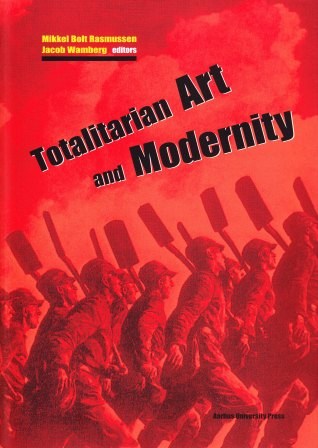Mikkel Bolt Rasmussen, Jacob Wamberg (eds.): Totalitarian Art and Modernity (2010)
Filed under book | Tags: · art history, avant-garde, capitalism, communism, democracy, fascism, labour, modernism, modernity, monument, mythology, nazism, politics, revolution, socialism, socialist realism, soviet union, technology, totalitarianism, war

“In spite of the steadily expanding concept of art in the Western world, art made in twentieth-century totalitarian regimes – notably Nazi Germany, fascist Italy and the communist East Bloc countries – is still to a surprising degree excluded from mainstream art history and the exhibits of art museums. In contrast to earlier art made to promote princely or ecclesiastical power, this kind of visual culture seems to somehow not fulfill the category of ‘true’ art, instead being marginalised as propaganda for politically suspect regimes.
Totalitarian Art and Modernity wants to modify this displacement, comparing totalitarian art with modernist and avant-garde movements; confronting their cultural and political embeddings; and writing forth their common generalogies. Its eleven articles include topics as varied as: the concept of totalitarianism and totalitarian art, totalitarian exhibitions, monuments and architecture, forerunners of totalitarian art in romanticism and heroic realism, and diverse receptions of totalitarian art in democratic cultures.”
With contributions by Mikkel Bolt, Sandra Esslinger, Jørn Guldberg, Paul Jaskot, Jacob Wamberg, Christina Kiaer, Anders V. Munch, Kristine Nielsen, Olaf Peters, K. Andrea Rusnock, and Marla Stone.
Publisher Aarhus University Press, Århus, 2010
Acta Jutlandica series, 9
ISBN 8779345603, 9788779345607
359 pages
via Mikkel Bolt
PDF (10 MB)
Comment (0)Aleksandar Bošković: Photopoetry and the Bioscopic Book: Russian and Czech Avant-Garde Experiments of the 1920s (2013)
Filed under thesis | Tags: · art, art history, avant-garde, book, constructivism, montage, photomontage, poetry, technology, typography, visual poetry

The extraordinary junction between poetry, photography and photomontage — photopoetry — flourished in avant-garde books and journals throughout Europe in the 1920s and 1930s. The new genre aspired to appropriate the products of technological culture in creating poetry more alert to the mass sensibility of a rapidly changing mechanical age. As a new hybrid form that combines poetic text and photographic images, it was ripe for poetic experimentation and production of optical provocations.
This dissertation focuses on three avant-garde photo-poetry books — Mayakovsky and Rodchenko’s About This (1923), Nezval and Teige’s Alphabet (1926), and Mayakovsky and Rozhkov’s unpublished and little known To the Workers of Kursk (1924-7) — examining them from the angle of the bioscopic book, a concept envisaged in a programmatic manner by El Lissitzky in 1923. (from the Abstract)
Dissertation
Slavic Languages and Literatures, University of Michigan, 2013
309 pages
PDF, PDF (9 MB, updated on 2020-7-23)
See also Mayakovsky and Rozhkov’s book in PDF (3 MB, via vk.com). Commentary: Bošković (2017).
Comment (0)Julia Vaingurt: Wonderlands of the Avant-Garde: Technology and the Arts in Russia of the 1920s (2013)
Filed under book | Tags: · 1920s, aesthetics, architecture, art, art history, avant-garde, biomechanics, body, cinema, communism, constructivism, design, literature, machine, politics, russia, science fiction, sexuality, socialism, soviet union, technē, technology, theatre

“In postrevolutionary Russia, as the Soviet government was initiating a program of rapid industrialization, avant-garde artists declared their intent to serve the nascent state and to transform life in accordance with their aesthetic designs. In spite of their professed utilitarianism, however, most avant-gardists created works that can hardly be regarded as practical instruments of societal transformation. Exploring this paradox, Vaingurt claims that the artists’ investment of technology with aesthetics prevented their creations from being fully conscripted into the arsenal of political hegemony. The purposes of avant-garde technologies, she contends, are contemplative rather than constructive. Looking at Meyerhold’s theater, Tatlin’s and Khlebnikov’s architectural designs, Mayakovsky’s writings, and other works from the period, Vaingurt offers an innovative reading of an exceptionally complex moment in the formation of Soviet culture.”
Publisher Northwestern University Press, 2013
SRLT series
ISBN 0810128942, 9780810128941
322 pages
via Sorin
Review: Boris Dralyuk (NEP, 2013), Tim Harte (Slavic Review, 2014).
PDF (updated on 2022-11-12)
See also the science-fiction film Aelita, Queen of Mars, dir. Yakov Protazanov, 1924, 111 min, based on Tolstoy’s novel.
Comments (2)
